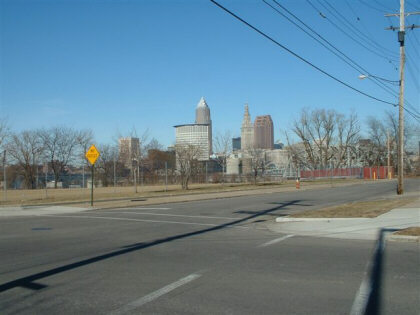 Avi Steinberg
Avi Steinberg
I remember growing up in Cleveland and watching people fly by overhead. Flying, I always imagined, to important places like New York, L.A., Chicago, Jerusalem, where real things happened. I never turned my slingshot to the sky; I didn’t want to hurt them, but to be a part of them, to bring them closer, to forge some sort of relationship with them. History was always happening somewhere else, somewhere out of reach.
I wondered if shooting fireworks into the sky wasn’t a demonstration of impotent rage or protest, or was it an attempt to escape. It seemed like an attempt to connect to something unreachable and bring it down to size. And by connecting with it, entering into its world of real things.
Many people believed that, with this election, history had in fact arrived in Ohio; and that it was in this kid’s hands. He didn’t need to shoot it out of the skies -- this time, people were looking at Ohio. Perhaps it was the lake-driven overcast grayness that looms over northeast Ohio from November until May but, even with the Democrats’ confidence running high, even I didn’t quite believe this.
III
The night before the election I returned to an old synagogue in my neighborhood. This shul—where I had had my bar mitzvah—was now a black revivalist church. Like a number of places in my old neighborhood, it was a building that Jews had built, and then abandoned when they moved on. The day before the church’s pastor had exhorted his flock to observe a day of fasting and prayer to “shake folks up,” he said. “Because there’s a lot of dry bones in this country this week and some even in this state and some even in this county and some right here in this congregation.” He reminded his audience that the ancient Hebrews would fast when they felt threatened.
I knew some of these ancient Hebrews—one of them once stood where this pastor now preached. He once told me that on Shmini Atzeret, the holiday that comes at the end of Sukkot and marks the end of the Jewish Days of Awe, the sky opens momentarily at midnight.
“Remember Ne’ila?,” asked the rabbi, as if I could forget. “It’s the very end of Yom Kippur, when the gates of prayer and repentance close for good. It’s like when the last seconds are ticking off the game clock in the NBA finals,” he said, in a characteristically lame but endearing attempt to make theology personal to a young basketball fan. “For some reason, the gates fly open for one more moment. If you stand outside, you will see the sky open at midnight, this is your moment. Speak into the opening.”
As I boarded my plane on Nov. 3, I heard the president’s victory speech playing live behind me on an airport television. Listening to him thank Americans for their prayers on his behalf, I recalled my last Shmini Atzeret in Ohio. I had been standing alone outside the old shul. The sky was overcast, of course; no opening to be seen. But these are just clouds, I remember thinking. Even though I couldn’t see it, I truly believed that the opening was still there. I remember looking up—aiming—and firing up some words.
On this occasion, however, I was too tired for words—I had had my fill of words in the days leading up to the election. And, as it turned out, there was no need: my plane took off so gently that I fell asleep almost instantly and missed the sight of Ohio disappearing beneath the clouds.

An interview with the Jews for Racial & Economic Justice Director
October, 2004
A debate between the author of "A Jewish Critique of Bushism" and the head of "L.A. for Bush"
October, 2004
To fear a Jewish president
February, 2004
Hypercapitalism as Satanism
June, 2003
The ambiguities of art and life
March, 2003
Alienated politics in an age of ignorance
December, 2002
CBS's packaging of the '9/11' documentary reveals exactly what America
fails to understand about September 11.
April, 2002



Let them Eat Myth
Douglas Rushkoff
Hipster Antisemitism
Jennifer Blowdryer and Alvin Orloff
To Ohio and Back
Avi Steinberg
The Knowing
Jay Michaelson
Abba Kovner: The Warrior in Old Age
James Russell
Men who Laughed
Ari Belenkiy
Archive
Our 610 Back Pages
Zeek in Print
Fall/Winter 2004 issue now on sale
About Zeek
Mailing List
Contact Us
Subscribe
Tech Support
Links
From previous issues:
Hasidism and Homoeroticism
Jay Michaelson
Jews, Goddesses, and the Zohar
Jill Hammer
Faith
David Goldstein
 Email us your comments
Email us your comments